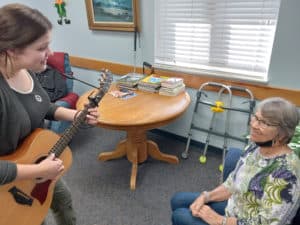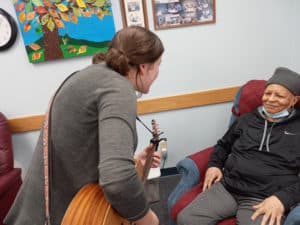Music Therapist at St. John’s Community Care Brings Increased Vitality to Adults with Memory Disorders

For years, St. John’s Community Care, based in Collinsville, Ill., has integrated music into its programs for people with Alzheimer’s disease, dementia, and other cognitive disorders. But having a professional music therapist was always beyond its budget capacity. So when a donor asked Nancy Berry, executive director, what program St John’s couldn’t offer due to lack of funding, she mentioned music therapy. As a result, the donor’s gift is serving as seed money to cover six months of weekly music therapy sessions.
Music Therapist Amanda Wick began working with St John’s clients, offering weekly hour-long music therapy sessions on Wednesday afternoons. The classes alternate between St. John’s two Adult Day Centers in Collinsville and Edwardsville.
Classes begin with participants sitting in a circle. Wick leads a welcome song, which she sings to each participant individually. The individual attention “gives each person an opportunity to respond and interact with the therapist,” says Stacey Rhodes, adult day program director. “The therapist may ask them questions about the song (how it makes them feel, etc.). This is to engage and encourage verbalization and stimulate memories. The goal is to connect with the participants and key into their needs and bring out the best in each one.”
Berry says that Wick effectively engages the participants, both individually and as a group. “Music therapy is an optimistic and innovative approach to aid people with memory loss,” she says. “Programs like this are a vision for how we can change the way we think and care for people with memory loss.”
Participants in St John’s music therapy classes sing solos, duets, play instruments, and move in rhythm. Through their activity during classes, participants have improved social awareness, interpersonal connections and behaviors. These results are in line with what countless studies have shown.

Jonathan Graff-Radford, MD, from the Mayo Clinic, cites the emotional and behavioral benefits of listening to or singing songs. Music can relieve stress, reduce anxiety and depression, and reduce agitation in patients with memory loss, he says. Plus, he adds, “musical memories are often preserved in Alzheimer’s disease because key brain areas linked to musical memory are relatively undamaged by the disease.”
Berry says that St. John’s is focusing on donor gifts to continue the funding. She is hopeful that the music therapy program will become a regularly budgeted offering.
For Rhodes, the difference in clients as a result of the classes is palpable. “I’ve seen happier moods with big smiles and increased sharing of memories,” she says. “The most amazing sight is when a participant has difficulty verbalizing as they are trying to share a thought or just put a sentence together, but they can sing every word of a song from their past. It brings me such joy because you can see the joy radiate form their whole person.”
“Music stimulates all parts of our body,” Rhodes adds. “Music therapy is a connection to help the participant experience the music to enhance the quality of life.”
St. John’s Community Care is accepting donations for its music therapy program. Click on the “Music Therapy” link.
Join Our Mailing LIst
"*" indicates required fields
Follow on Facebook
New Resident Finds Belonging at Emmaus Homes - CHHSM
www.chhsm.org
Heather’s journey toward independence has been nothing short of inspiring. Since moving into her new home last year, Heather’s world has expanded in ways she never imagined. Leaving the familiarit...